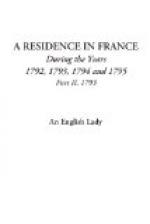The little distresses I formerly complained of, as arising from the paper currency, are nearly removed by a plentiful emission of small assignats, and we have now pompous assignments on the national domains for ten sols: we have, likewise, pieces coined from the church bells in circulation, but most of these disappear as soon as issued. You would scarcely imagine that this copper is deemed worthy to be hoarded; yet such is the people’s aversion from the paper, and such their mistrust of the government, that not an housewife will part with one of these pieces while she has an assignat in her possession; and those who are rich enough to keep a few livres by them, amass and bury this copper treasure with the utmost solicitude and secresy.
A tolerably accurate scale of the national confidence might be made, by marking the progress of these suspicious interments. Under the first Assembly, people began to hide their gold; during the reign of the second they took the same affectionate care of their silver; and, since the meeting of the Convention, they seem equally anxious to hide any metal they can get. If one were to describe the present age, one might, as far as regards France, call it, both literally and metaphorically, the Iron Age; for it is certain, the character of the times would justify the metaphoric application, and the disappearance of every other metal the literal one. As the French are fond of classic examples, I shall not be surprized to see an iron coinage, in imitation of Sparta, though they seem in the way of having one reason less for such a measure than the Spartans had, for they are already in a state to defy corruption; and if they were not, I think a war with England would secure the purity of their morals from being endangered by too much commercial intercourse.




